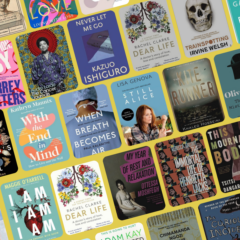Since we took over the running of the Medicine in Literature collection, we’ve been working to broaden its perspective by adding books on health, illness and medicine written by people of colour and other groups who are marginalised by systemic discrimination, such as the trans community and people with disabilities.
The current global discussions surrounding systemic racism and inequality have reaffirmed our commitment to this work but also made us re-evaluate the ways in which we’re doing this, to make sure we’re doing this in the right way, asking the right questions and looking in the right places for new resources to add to the collection.
We’ve written this blog post to outline the work we’re going to do to address some of the issues raised by the Black Lives Matter protests and also highlight some recent additions to the collection by writers of colour.
As our library’s medical students will go on to treat people from all walks of life, the main aim of Medicine in Literature, and the wider Medical Humanities, is to help develop a deeper understanding of how a person’s experiences, values, and culture can affect their health. In addition, our students come from diverse backgrounds and we want to ensure they see themselves reflected in our resources.
Since we became curators of the collection we’ve prioritised diversifying the collection’s resources to ensure it’s inclusive in its representation of the patient population, and that it gives voice to a variety of experiences and reflections on the human condition from a breadth of social and cultural viewpoints. To this end, we’re committed to continually reassessing our collection to ensure it includes voices from underrepresented groups in society who are marginalised because of ethnicity, class, gender, dis-ability or sexual orientation. The conversations and debates arising from the Black Lives Matter protests have made us consider whether we could be doing this more effectively, and we wanted to outline some of the ways in which we’re going to shape our collection in future in response to these issues.
Firstly, we’ve resolved to be much more proactive in seeking out new additions to the collection by Black authors and other under-represented groups, rather than waiting for people to recommend them to us. We’ll be keeping up to date with releases from independent publishers owned by people of colour (there’s a great list here) rather than relying mainly on newspaper reviews, book prize shortlists and Amazon.
Secondly, we’ll be seeking to add more resources to the collection specifically looking at the impact of racism and discrimination on mental and physical health. We’ve recently added the non-fiction anthology The Colour of Madness, which brings together the experiences of people from BAME backgrounds with lived experience of mental illness.
Thirdly, we’re committing ourselves to personally reading much more widely in our search for books to add to the collection. To begin with, we’ll be working our way through the Diverse Spines reading challenge booklist and adding any books from this list that would be a good fit for the collection.
As mentioned above, we’re committed to educating ourselves and amplifying Black and other underrepresented voices in the Medicine in Literature collection, and sourcing new material ourselves rather than relying on others to do this work for us. However, if there is a book or author that you feel would be a good addition to the collection, we always welcome recommendations – you can use the suggestions box on the front page of this guide to get in touch with us.
Here are some recent additions to our collection by Black authors – we’ll be adding new resources as soon as we’re back at work in the Walton Library.
Freshwater by Akwaeke Emezi
Human: Voices of Tomorrow’s Doctors edited by Tolu Kehinde
Stay With Me by Ayọ̀bámi Adébáyọ̀
Nervous Conditions by Tsitsi Dangarembga
We’re aware that we have a long way to go in diversifying our collection – it’s an ongoing concern for us and we’re continuously reading, learning and educating ourselves on issues related to this. For more information about the University’s response to the issues raised by the Black Lives Matter movement, click here.
